A Virtual Private Network is a service that lets you connect to a remote, virtual server and route your traffic through it to get privacy and online security. This service encrypts your connection, thus, making it untraceable from your internet providers, snoopers, hackers, and so forth. When using a VPN, your connection is encrypted once using 256-bit encryption and sent to a single server of your choice. But what is a Double VPN? As its name implies, Double VPN uses two different servers to route your traffic for added privacy and security.
In this case, your traffic goes through two servers in two different countries, which encrypts your connection twice and makes your IP address even harder to track. Sadly, this feature isn’t very popular and not many providers will offer it in 2025.
But if you want to know more about what is Double VPN, how it works, how to set it up, when to use it, and everything else, you’re at the right place. And if you end up being very interested in using it, we’ll also present you with a few services that offer this feature so that you can get into it right away.
What Is a Double VPN?
Okay, I’ve given you a brief explanation of the term Double VPN but let’s talk more about it now. This feature is also known by the name Multi-Hop or MultiHop, depending on what the provider calls it. While we have the word “Multi” in the name, it doesn’t refer to more than two VPN servers.
Either way, a Double VPN feature uses two servers to double your encryption to give you additional privacy and security. Usually, this feature lets you choose from pairs of pre-determined server combinations of two locations.
In other words, you can’t choose entry and exit servers, as they’re already defined by the provider. Let’s take NordVPN as an example. This provider offers around a dozen Double VPN locations which you can’t tweak additionally.
7492 servers
118 covered countries
30 days money-back guarantee
10 simultaneous connections
9.8 /10
There’s a pair called Hong Kong – Taiwan, which I often use. In this case, the provider routes your traffic through the server in Hong Kong, that server applies encryption, and then the traffic goes through the server in Taiwan to be encrypted again, making your connection significantly more secure.
Some provider, like Surfshark, offers the ability to customize MultiHop (Double VPN). In this case, you can choose both servers and select the exact locations for your connection to be routed. People like Double VPN because of its security and privacy.
However, many users don’t want to use it because it demands more computing resources and above all, influences the connection speed negatively. Later in our Double VPN explanation article, we’ll talk about its pros and cons – for now, let’s focus on explaining it further.
How Does Double VPN Work?
Now that you know what is Double VPN, let’s talk about how exactly it works. To make sure you really understand the meaning of Double VPN and its workflow, let’s first see how a regular VPN connection works.
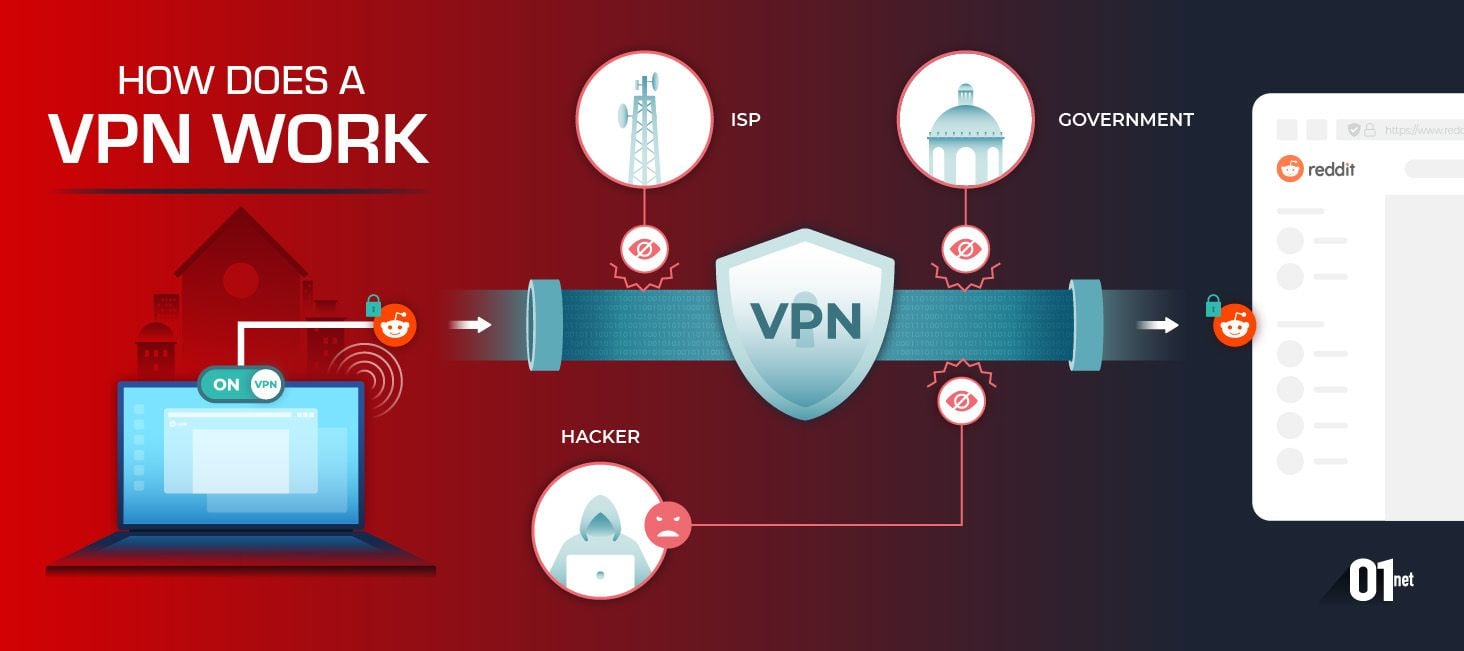
When you connect to a particular server, the following happens:
- The VPN application that you’re using encrypts your connection and sends it to the server you are connected to.
- This server now decrypts the connection and hides your IP address. You now have an IP address from that particular server instead of using your original IP to go online.
- Next, the server sends this unencrypted traffic to its destination, which is the website you want to visit.
As you can see, we’re talking about a single server. But what happens when another server is introduced? Here’s an explanation.
- Upon enabling Double VPN, the app will encrypt your traffic the same way and send it to the first server.
- This server applies encryption again and changes your IP address. It hides your original IP and assigns you the IP of that server.
- The traffic that now has two layers of encryption is sent to the second server.
- The second server then decrypts the traffic and sends it to the destination, which is the website that you’re trying to visit.
In this case, as you can notice, you get TWO layers of encryption and TWO changes to your IP address. Instead of the site that you’re visiting seeing your first IP, it sees the IP address of the second VPN server. Let’s take this Hong Kong – Taiwan combination again.
If we’re talking about using this combination of server locations, the site that you’re trying to visit sees a Taiwanese IP address rather than the IP from Hong Kong. This makes it incredibly difficult (impossible) for hackers or anyone else to get through your original IP address.
Double VPN Pros & Cons
Having in mind all of its greatness, why is Double VPN still not a mandatory feature in all services? Why isn’t ExpressVPN offering it, for example? Well, let’s talk about its pros and cons that might help you determine whether or not you’ll want to use it based on everything it offers – or doesn’t offer.
Double VPN Advantages
We don’t want to start with the bad stuff, so let’s talk about the positive things about Double VPN first.
You Get Two IP Addresses & Layers of Encryption
One of the best things about Double VPN is that you get everything double. Your connection isn’t encrypted just once but twice and the traffic is routed through two different servers. While using a single server is enough for the most part, in severe cases, you need additional security.
For example, if you’re a whistle-blower and you want to go on the dark web anonymously, the Double VPN feature will properly secure your connection and make you 100% untraceable online. This has one downside that I’ll talk about in a minute.
But generally speaking, Double VPN is indeed safer than a single VPN connection. For example, if someone intercepts your second IP address, there’s another IP address and another layer of encryption before that IP goes through, which, once again, is impossible to breach.
Inability to Be Tracked Online
Knowing this information, it’s easy to see that, by using Double VPN, you’re untraceable online and your online activities are really anonymous. This applies even to your ISP who won’t have a clue about your online whereabouts, opening possibilities for safe torrenting, anonymous streaming, etc.
No One Can See Your Real Location
Another excellent benefit is that no one can see your real location, which is great from an anonymity standpoint. You get two IP addresses from two different countries, yet, only the IP from the second country is displayed! So where are you really located? No one knows except you.
Double VPN Disadvantages
We can see that the meaning of Double VPN lies in the additional security and privacy. This implies that its downsides have to do with the performance, which is indeed the case. Let’s talk about the downsides of this great feature.
Slower Connection Speeds
One of the greatest concerns about this feature is its impact on performance. Let’s be real. The performance hit is indeed noticeable especially if we’re talking about two servers that are very far from you. For one, a single VPN connection will reduce your speed slightly.
How much will a VPN decrease your speed? It depends on your distance to the server and the quality of the server infrastructure. With Double VPN, this decrease is more dramatic due to a double encryption layer that will slow the connection down additionally.
And here, I want to mention a few notable examples. While this feature will allow you to go on the Dark Web in total and complete safety, in combination with Tor, it will make everything extremely slow, with seconds-long page-loading times.
Theoretically, Double VPN also makes torrenting more secure, which is crucial in some countries. But due to two layers of encryption, torrenting performance will be impacted negatively and you’ll be left with slower download/upload speeds and higher ping.
For a quick test, I used NordVPN to connect to a server in Taiwan using a regular connection. Here are the speed test results I got:
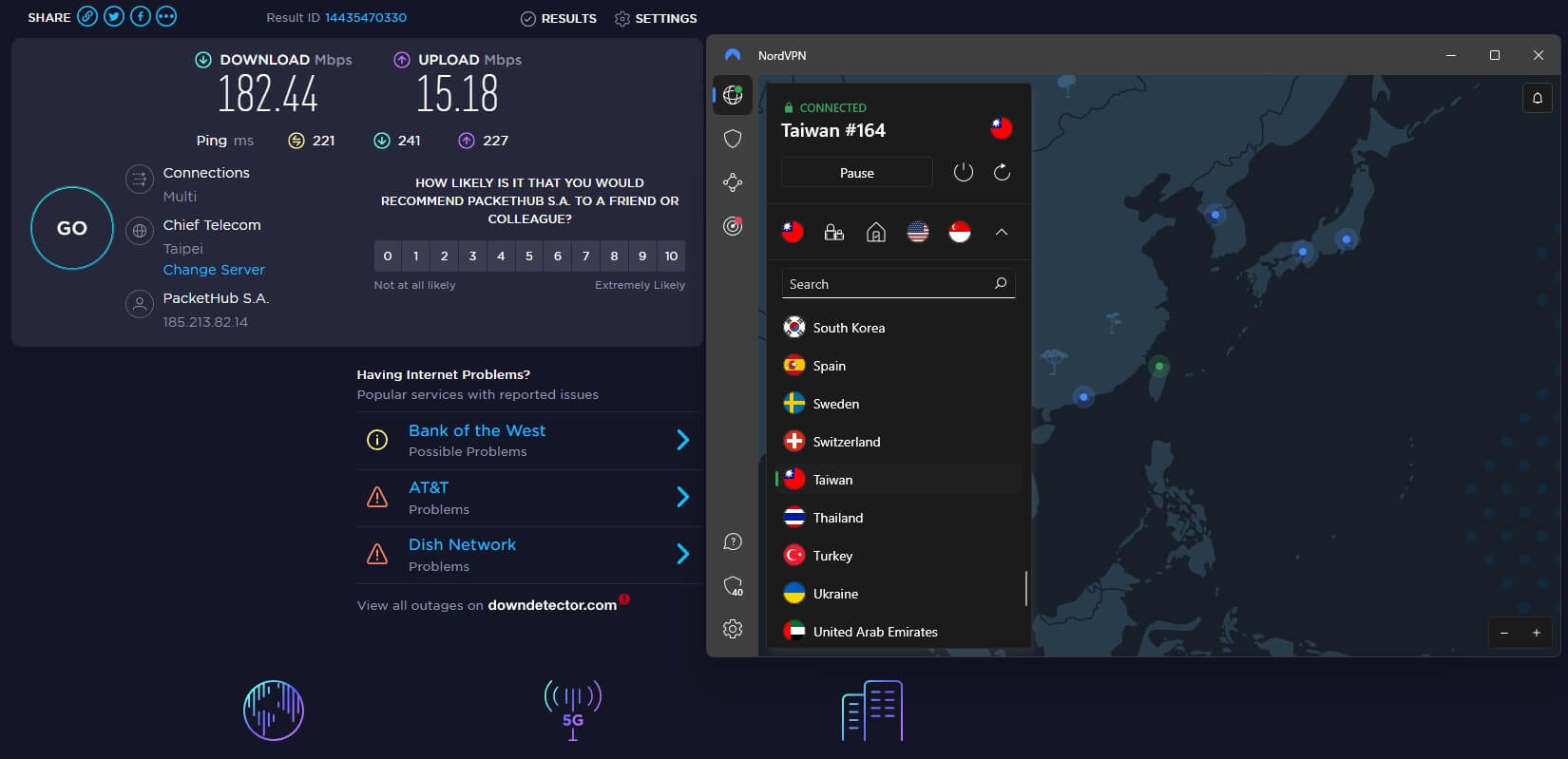
And then, when using the Hong Kong – Taiwan combination I talked about earlier, the speed test results were very different.
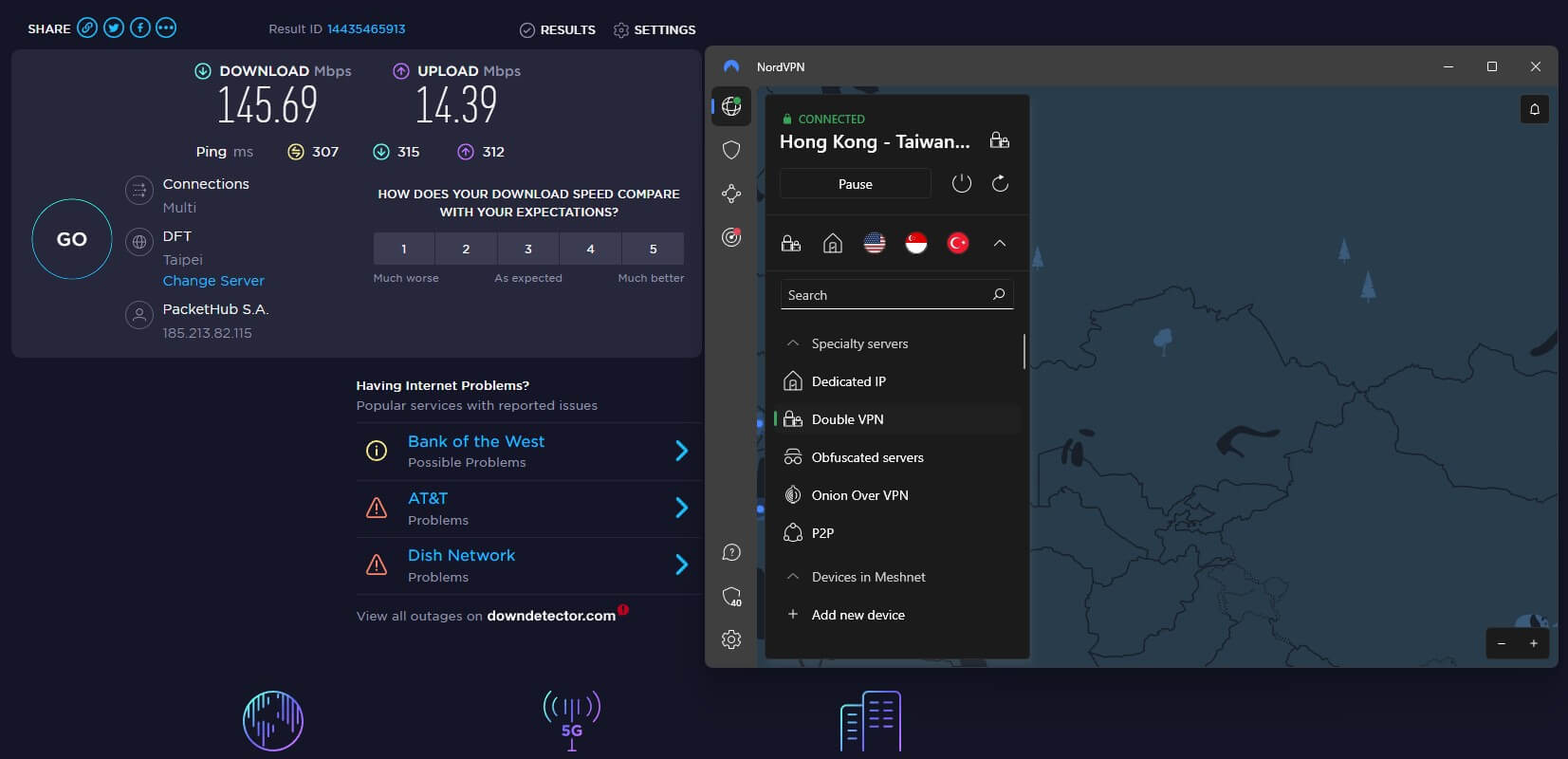
The download speed saw a noticeable decrease while my ping went from 221 ms to 307 ms. In NordVPN the performance decrease isn’t massive because we’re talking about one of the top-rated VPNs in 2025. However, using a slower Virtual Private Network will definitely produce more dramatic performance decreases.
Higher Battery Consumption on Mobile Devices
If you’re using a VPN on your phone, you know that it drains your battery faster. However, using Double VPN is resource-hungry due to all the stuff going on, so it requires even more juice, which isn’t great if your battery life isn’t great, to begin with.
Thus, users who use a laptop or a mobile phone are better off connecting these devices to a charger while Double VPN (MultiHop) is in function.
Most VPNs Limit Your Double VPN (MultiHop) Server Choice
Let’s face it, one of the worst things about Double VPN is not being able to choose from as many server locations as with the “normal” connection. NordVPN, for example, offers 60+ countries to choose from but then, you have just 10 or so Double VPN combinations to pick from.
And they’re predetermined.
Although with this feature, the accent isn’t on your virtual location, I’d still like to be able to choose my second server, for example. This way, I can still unblock a site while retaining the rock-solid security, anonymity, and privacy of this functionality.
How to Set Up Your Own Double VPN and Will It Work?
The concept of this feature is pretty clear. It uses two servers instead of one, so the natural question will always come to people’s minds – why not set up my own Double VPN by using two different VPN providers? Is that even possible?
Well, it really depends on the providers that you’re planning to use. I found that Surfshark alarmed me each time it detected that another service was turned on, even though it was only a background process. On the other hand, other providers can pair with a second VPN just fine.
Generally speaking, this setup isn’t such a bad idea as long as you’re pairing the providers that work and that are safe and secure enough. If one provider is storing logs and is known for the lack of privacy while the other one is the polar opposite, you’re not achieving anything.
You need to have two secure providers, to begin with, and then think about combining them. Unfortunately, the majority of providers aren’t built for something like this, and in most cases, when you enable one VPN, the second VPN will try to connect over again until it gives you an error message.
Not to mention that using two providers separately induces more costs, as you’ll pay for two subscriptions. Either way, if you happen to have two subscriptions already, here’s what to try to create the Double VPN setup you want.
Using Different VPN Protocols
Whenever I tried pairing two providers without additional tweaking, I usually had no luck. That’s because the protocols that the VPNs were using were most likely overlapped. For instance, if I connect to the first Virtual Private Network which is using OpenVPN, another provider most likely used the same protocol.
To fix this issue, you need to make sure that the two providers use different protocols. The easiest way, at least for me, is to set one provider to OpenVPN and the other to IKEv2 or vice versa. Then, simply connect to the first VPN, and when the connection is in place, try connecting to another one.
If it connects, the Double VPN setup is complete and you’ll have two layers of encryption with the IP from the second server visible. If not… well, the providers you’re using aren’t designed to work this way and you can try another method.
Taking Advantage of a VPN Browser Extension
You can take a simpler approach to the problem and use a VPN for Chrome, Firefox, or Edge in combination with a full-fledged VPN app. In this case, connect to a server using the app and then open your browser and connect to the VPN browser extension.
This will most likely work with one big downside – the Double VPN benefits will only apply to the in-browser traffic, while every other incoming/outgoing traffic will be encrypted once. There are more solutions to this issue, such as installing a VPN on a router or using a virtual machine, for example.
However, I think doing so is the law of diminishing returns. You’ll just end up wasting a lot of time and putting in a lot of effort, with no guarantee of success. The best and most reliable way is to use a provider with native Double VPN support, which we’ll talk about in just a second.
Best Services With Double VPN: Our 3 Favorite Providers
In the end, let me recommend to you my top 3 favorite services that offer Double VPN, some of which I already mentioned in this article.
1. NordVPN
My favorite provider with Double VPN is NordVPN. This service is known for blazing-fast performance along with 256-bit encryption, a kill switch, and other notable security features. Double VPN functions flawlessly in NordVPN and it’s not going to drastically impact your performance, as you’ve seen.
This is one of the reasons why it’s my favorite pick, as it offers 10 Gbps servers that perform the best, along with ExpressVPN, which, unfortunately, doesn’t offer MultiHop. Either way, NordVPN is completely safe to use due to a no-logging policy.
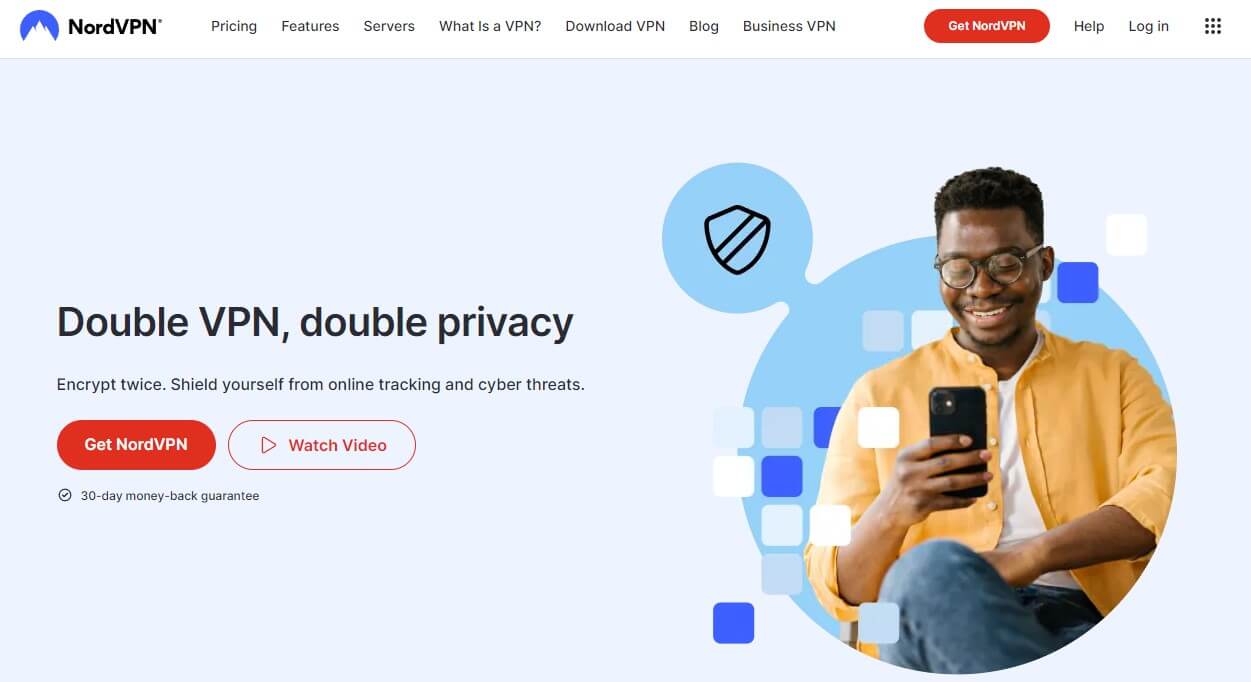
All of this is accompanied by Threat Protection, a feature that has malware and virus protection along with CyberSec, which serves as a formidable ad-blocker. NordVPN is a great choice for streaming, torrenting, and even going on the darknet in complete anonymity.
It also has Dark Web Monitor and Meshnet, both of which are excellent for privacy and security. Most importantly, the provider has apps for ALL devices and platforms, making it usable for iOS, Android, Windows, macOS, Linux, and even Fire TV users.
There’s a special discount on NordVPN’s 2-year plan that comes with a 30-day money-back guarantee. This allows you to test its Double VPN functionality and see how well it works for you.
Pros
- Threat Protection function
- Apps for all devices
- 6,000+ servers in 61 countries
- Exclusive discounts year-round
- Reliable for streaming and P2P
Cons
- Rare connection problems on Windows
2. Surfshark
Surfshark is working in tandem with NordVPN to bring you its A-game at a cheaper price. Much like its partner, Surfshark offers MultiHop. As said, it’s the same feature with a different name. While Surfshark also offers predetermined pairs to pick from, it also lets you create a custom Double VPN connection.
This completely eliminates the need to use two VPNs or resort to other silly tactics. Simply click on MultiHop, click on the “Create Connection” button, and set the two servers to your preference. This provider, much like its partner, is renowned for its focus on privacy and security.
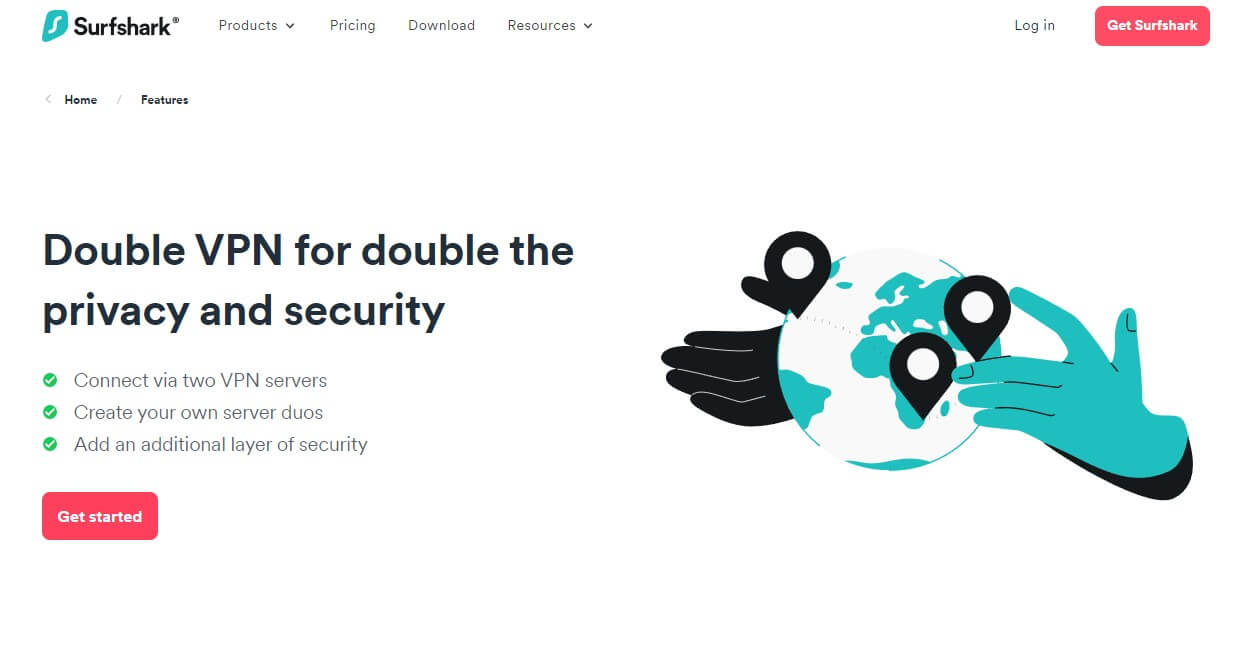
While a bit slower, it’s still reasonably fast with its 3,200+ in 100 countries that are incredibly reliable. In addition, the service comes with a certified no-logging policy coupled with WireGuard support, an ad-blocker, split tunneling, and a kill switch.
Surfshark is more affordable than NordVPN, though, so it’s a good start if you want to get into MultiHop on a budget. I recommend its 2-year plan with a 30-day refund period that’ll cost you approximately 50% less than NordVPN.
Pros
- Customizable MultiHop (Double VPN)
- Includes split tunneling
- No-logging policy with audits
- Cheap 2-year plans
Cons
- Occasional kill switch problems
- Expensive Surfshark One+ monthly plan
3. Private Internet Access
Private Internet Access is a VPN service based in the US. Before you even ask, it’s incredibly safe and secure, with a no-logging policy proven in court several times. This provider offers MultiHop in its app, where it also applies obfuscation to the traffic, making things even more secure.
Try Private Internet Access Today
It’s similar to Surfshark in a way that it allows you to choose the entry and exit servers. However, it’s different because it allows for MultiHop through the use of its Shadowsocks and SOCKS5 proxies.
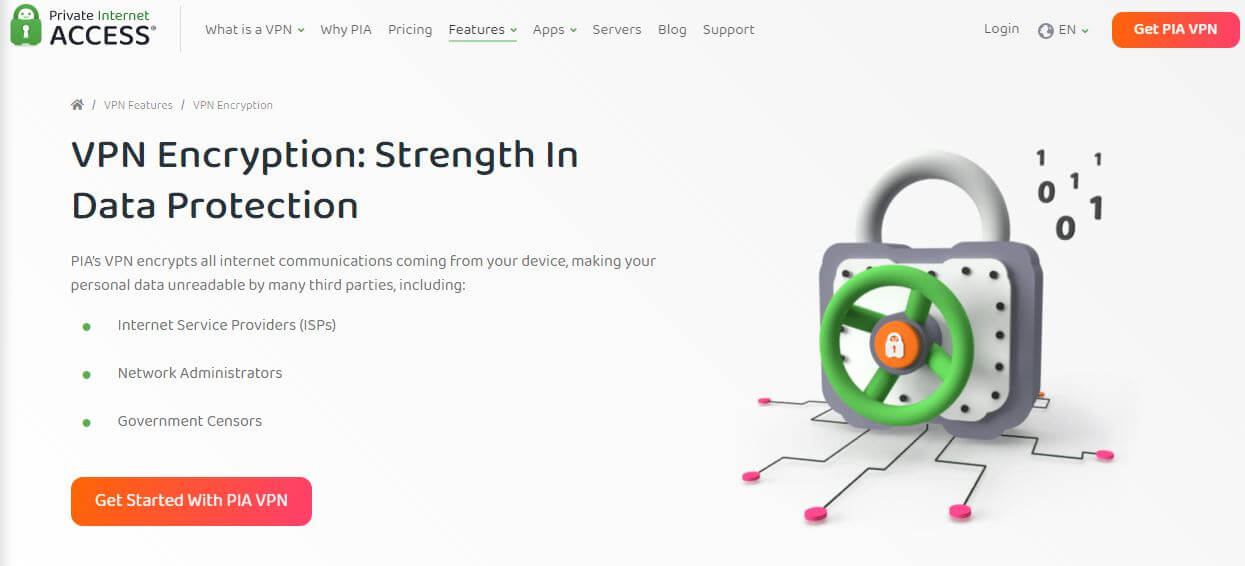
In any case, the feature is easy to understand and set up, after which, Private Internet Access will properly secure your connection and make you untraceable online. This provider packs 30,000 worldwide servers, it’s torrent-friendly and comes with incredibly cheap subscription plans.
As always, I recommend its longest plan which allows for a large discount and a 30-day money-back guarantee. For this money, you get a no-logs policy, solid performance, an ad-blocker, WireGuard support, and so much more, all of which I addressed in my review of Private Internet Access.
Pros
- Unlimited simultaneous connections
- Shadowsocks & SOCKS5 proxies
- PIA MACE for blocking ads
Cons
- No native Firestick TV app
- It lacks a free version
- Based in the US
Conclusion
Putting things into perspective, it’s easy to see that Double VPN can be a very powerful security tool. Not only it encrypts your connection twice but it also makes you completely untraceable online as a result of added encryption and a bonus IP address.
This makes Double VPN useful for journalists, whistleblowers, or any other users looking for the highest possible level of security. If you’re ready to sacrifice a bit of performance and battery life (on your phone, tablet, or laptop), Double VPN will make a big difference.
Since it’s not a mandatory feature and not every provider offers it, it’s crucial to find a provider that has proper support for it. We recommend using NordVPN but providers like Surfshark and Private Internet Access are also great choices, coupled with Atlas VPN which also allows for MultiHop.
FAQ
Let’s answer a few additional questions we haven’t addressed in this article.
Is a Double VPN available on free VPNs?
No, this feature is available strictly on premium VPNs given its more sophisticated nature. Not a single free provider offers it, so you’ll have to pay for a subscription to use it.
Are Double VPN connections safer than single VPN connections?
Yes, they’re undoubtedly safer due to the double layer of encryption and the use of two IP addresses. However, Double VPN connections are significantly slower for the same reason.
Can I use a kill switch with Double VPN?
Yes, you can. A kill switch will work if you have issues with your VPN connection and it breaks for any reason. Even if one out of the two servers fails, the kill switch will spring into action and disable all traffic, preserving your online privacy.
In short, a kill switch will function either way, regardless of the type of connection or any other parameters. As long as the kill switch is enabled, you don’t need to worry about its functionality.
Does ExpressVPN offer a Double VPN function?
Unfortunately, this provider has yet to offer Double VPN. While it’s phenomenal in terms of security and everything else, this feature is lacking. Still, you can enjoy ExpressVPN’s no-logging policy and RAM-only servers that should make up for it.
If this is a deal-breaker, NordVPN remains the best ExpressVPN alternative, as CyberGhost lacks Double VPN as well.